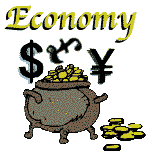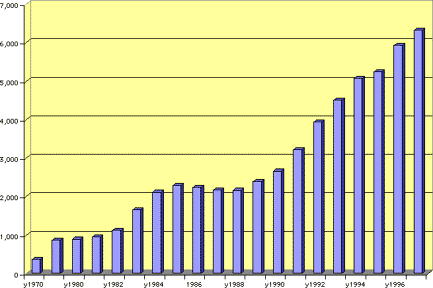|

SEYCHELLES
GDP: $1,715 million.
Annual growth rate (2008): 0%.
Per capita income: $19,800.
Avg. Inflation rate (2008): 37%.
Budget: Income .............. $260 million
Expenditure ... $291 million
Main Crops: Coconuts, cinnamon, vanilla, sweet potatoes, cassava (tapioca), bananas; broiler chickens; tuna fish .
Natural Resources: fish, copra, cinnamon trees .
Major Industries: Fishing; tourism; processing of coconuts and vanilla, coir (coconut fiber) rope, boat building, printing, furniture; beverages.
|
| NATIONAL GNP |
 |
Based on per capita income, the overall performance of the economy since independence must be considered satisfactory, with a seven-fold increase from some $1,000 per capita in 1976 to $7,600 today. The public sector, comprising the government and state-owned enterprises, dominates the economy in terms of employment (two-thirds of the labor force) and gross revenue. Public consumption absorbs over one-third of the gross domestic product (GDP). GDP growth in 2001 was 3.3%.
The economy rests on tourism and fishing. For 2000, the Central Bank estimates that the Seychelles economy grew by around 1.4% in real terms, despite a foreign exchange problem, which affected primarily the manufacturing industry. The economy's growth in 2000 was thanks largely to a rebound in the tourism industry and the strength of the fishing sector. In 2001, tourism accounted for about 12.7% of GDP, and the manufacturing and construction sectors, including industrial fishing, accounted for about 28.8%.
But the country’s economy is extremely vulnerable to external shocks. Not only does it depend on tourism, but it imports more than 90% of its total primary and secondary production inputs. Any decline in tourism quickly translates into a fall in GDP, a decline in foreign exchange receipts, and budgetary difficulties. Furthermore, recent changes in the climate have greatly affected the tuna industry.
Services
Tourism is one of the most important sectors of the economy. Employment, foreign earnings, construction, banking, and commerce are all dominated by tourism-related industries. Tourism arrivals, one of the two main indicators of vitality in the sector, grew by 4.1% in 2000. A strong marketing effort by the Seychelles Tourism Marketing Authority (STMA) and the introduction of several new five-star hotels seems to have spurred the growth. Officials hoped that new hotels on the drawing board and expanded airline service to the island would help offset the possibility of reduced global travel in the environment following the September 11, 2001 terrorist attacks in the U.S. In 2003, tourism earned $681.3 million. About 122,000 tourists visited Seychelles in 2003, 81.7% of them from Europe (U.K., Italy, France, Germany, Switzerland).
In 2000, there were encouraging performances in service sectors besides tourism, namely the telecommunications sector, where the boom in mobile services continues. According to the telecommunications division of the Ministry of Information Technology and Communication, one in every four Seychellois owns a mobile phone. In recent years, some port operations have been privatized, a trend that has been accompanied by a fall in transshipment fees and an increase in efficiency. Overall, this has sparked a recovery in port services following a drastic fall in 1994.
The Ministry of Finance is responsible for economic decisions and budgetary policy. A separate Monetary Authority supervises the banking system and manages the money supply. Although foreign banks operate branches in Seychelles, the government owns the two local banks--the Development Bank of Seychelles, which mobilizes resources to fund development programs, and the Seychelles Saving Bank, a bank for savings and current accounts. The commercial banking sector is presently made up of the following:
• Barclays Bank PLC;
• Mauritius Commercial Bank;
• Bank of Baroda;
• Habib Bank; and
• Seychelles International Mercantile Credit Banking Corporation (SIMBC) trading under the name "Nouvobanq".
The first four are branches of foreign banks, and the latter is a joint venture between the Seychelles Government and the Standard Chartered Bank African PLC. Commercial banks offer the full range of services.
Industry and Agriculture
Industrial fishing in Seychelles, notably tuna fishing, is an increasingly significant factor in the economy. In 2000, industrial fishing surpassed tourism as the most important foreign exchange earner. Earnings are growing annually from licensing fees paid by foreign trawlers fishing in Seychelles' territorial waters. In 1995, Seychelles saw the privatization of the Seychelles Tuna Canning Factory, 60% of which was purchased by the American food company Heinz Inc.
Agriculture (including artisanal and forestry), once the backbone of the economy, now accounts for only around 2.4% of the GDP. While the tourism and industrial fishing industries were on a roll in the late 1990s, the traditional plantation economy atrophied. Cinnamon barks and copra--traditional export crops--had dwindled to negligible amounts by 1991. There were no exports of copra in 1996; 318 tons of cinnamon bark was exported in 1996, reflecting a decrease of 35% in cinnamon bark exports from 1995. In an effort to increase agricultural self-sufficiency, Seychelles has undertaken steps to make the sector more productive and to provide incentives to farmers. Much of the state holdings in the agricultural sector have been privatized, while the role of the government has been reduced to conducting research and providing infrastructure.
Other industrial activities are limited to smallscale manufacturing, particularly agro-processing and import substitution. Despite attempts to improve its agricultural base and emphasize locally manufactured products and indigenous materials, Seychelles continues to import 90% of what it consumes. The exceptions are some fruits and vegetables, fish, poultry, pork, beer, cigarettes, paint, and a few locally made plastic items. Imports of all kind are controlled by the Seychelles Marketing Board (SMB), a government parastatal which operates all the major supermarkets and is the distributor and licensor of most other imports. |
|
|


